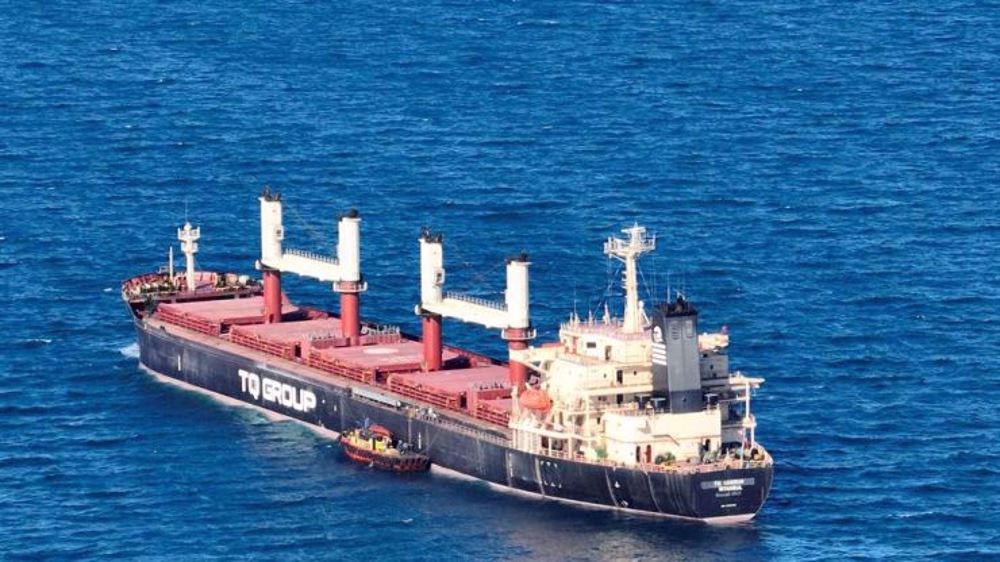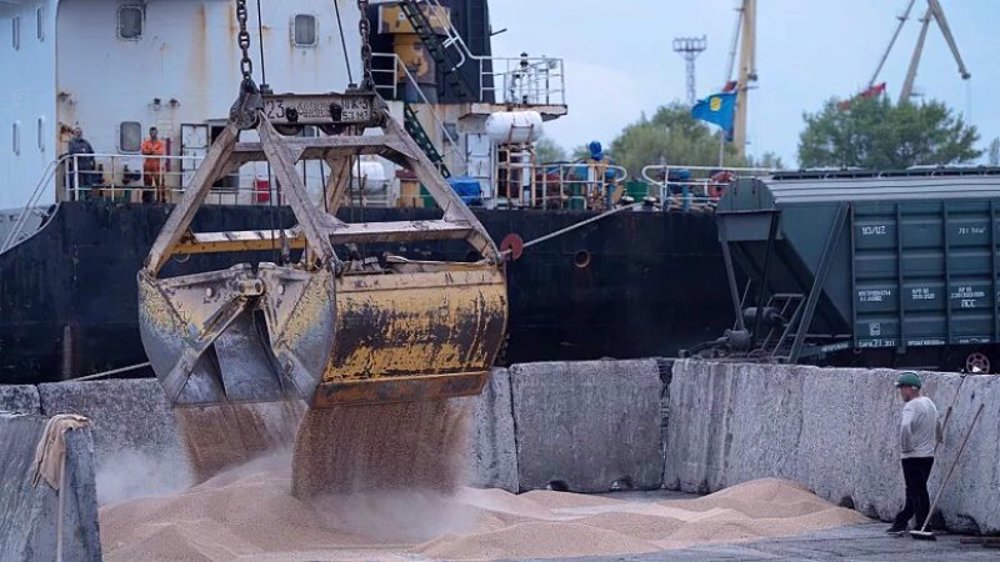Russia says all ships traveling to Ukraine considered potential carriers of arms, part of war
Russia has warned that all ships traveling to Ukraine are considered to be potentially carrying weapons and military equipment, and thus be part of the current war in the ex-Soviet republic.
In a statement on Wednesday, Russia's defense ministry said from Thursday on, it would deem all Ukraine-bound vessels to be potentially carrying arms on behalf of Kiev, and consequently "the flag countries of such ships will be considered parties to the Ukrainian conflict."
"In connection with the termination of the Black Sea Initiative and the end of the maritime humanitarian corridor, from 00.00 Moscow time on July 20, 2023 (2100 GMT on Wednesday) all ships proceeding to Ukrainian ports in Black Sea waters will be considered as potential carriers of military cargo," the ministry added, without saying what actions it might take toward such ships.
Russia did not extend the grain deal that allowed Ukrainian grain to be exported. The agreement last came up for extension on May 18 and Russia agreed at that point to extend it for 60 more days.
On Monday, however, Moscow announced its withdrawal from the deal, which came with a separate agreement to facilitate shipments of Russian food and fertilizer. Moscow says no facilitation under that agreement has yet taken place. The Kremlin had initially threatened to abandon the deal if its concerns were not addressed.
The deal is officially known as the Black Sea Grain Initiative. It was brokered by Turkey and the United Nations on July 22, 2022 and has since, according to the Joint Coordination Center in Istanbul, allowed three Ukrainian ports to export some 32.9 million metric tons of grain and other food to the world, over half of that to developing countries.
The ministry also said that southeastern and northwestern parts of the Black Sea’s international waters would be temporarily unsafe for navigation, without specifying the affected parts of the sea.
"Accordingly, the countries of such vessels will be considered to be involved in the Ukrainian conflict on the side of the Kiev regime. In addition, a number of sea areas in the north-western and south-eastern parts of the international waters of the Black Sea have been declared temporarily dangerous for navigation. Corresponding information warnings on the withdrawal of safety guarantees to mariners have been issued in accordance with the established procedure," the statement further read.
The development comes as Ukrainian officials claimed that an overnight attack on Wednesday by Russian drones and missiles against Odessa purportedly targeted grain terminals and other critical infrastructure Ukraine needs to ship food to the world.
Odessa, Ukraine's third most populous city, is one of the main ports for exporting grain in the ex-Soviet republic.
Russia's foreign ministry has already said that despite UN efforts to extend the deal, obstacles to Russian food and fertilizer exports remained. "Only upon receipt of concrete results, and not promises and assurances, will Russia be ready to consider restoring the deal."
This is while Kiev has told the UN that it is establishing an alternative route for its grain export via Romania, one of the neighboring Black Sea countries.
“Its goal is to facilitate the unblocking of international shipping in the northwestern part of the Black Sea,” Vasyl Shkurakov, Ukraine’s acting minister for communities, territories and infrastructure development, said in a letter to the world body's shipping agency, the International Maritime Organization (IMO).
Ukraine, which is a major exporter of corn, barley, sunflower oil, and rapeseed oil, used to export most of its crop yields through its main ports on the Black and Azov Seas, but since the start of war, it has been forced to export by train or via its small Danube River ports.
More than 30 million tons of grain and agricultural products have been exported under the initiative to date. Any disruption or halt to the flow of Ukrainian grain could worsen a food crisis in the poorest countries and increase global prices.
The termination of the unprecedented wartime agreement prevents hunger-stricken parts of the world from receiving the vital crop.

Russia, US diplomats to meet in Istanbul to discuss restoration of embassies: Lavrov

Iran’s president vows to accelerate cooperation with Russia

Iran rules out nuclear talks with US amid ‘maximum pressure’ campaign
Over dozen settlers injured in anti-Israel operation near Haifa
Pezeshkian: Iran open to talks but won’t capitulate to bullies
VIDEO | Iran unveils advanced naval arsenal
VIDEO | Reunion of released Palestinians and their families in Khan Yunis
Kurdish leader Ocalan calls on PKK militants to end war with Turkey
Health leader warns Africa's health services at risk of 'collapse'
VIDEO | Press TV's news headlines
Iranian flotilla makes port call in India with 'friendship message'









 This makes it easy to access the Press TV website
This makes it easy to access the Press TV website